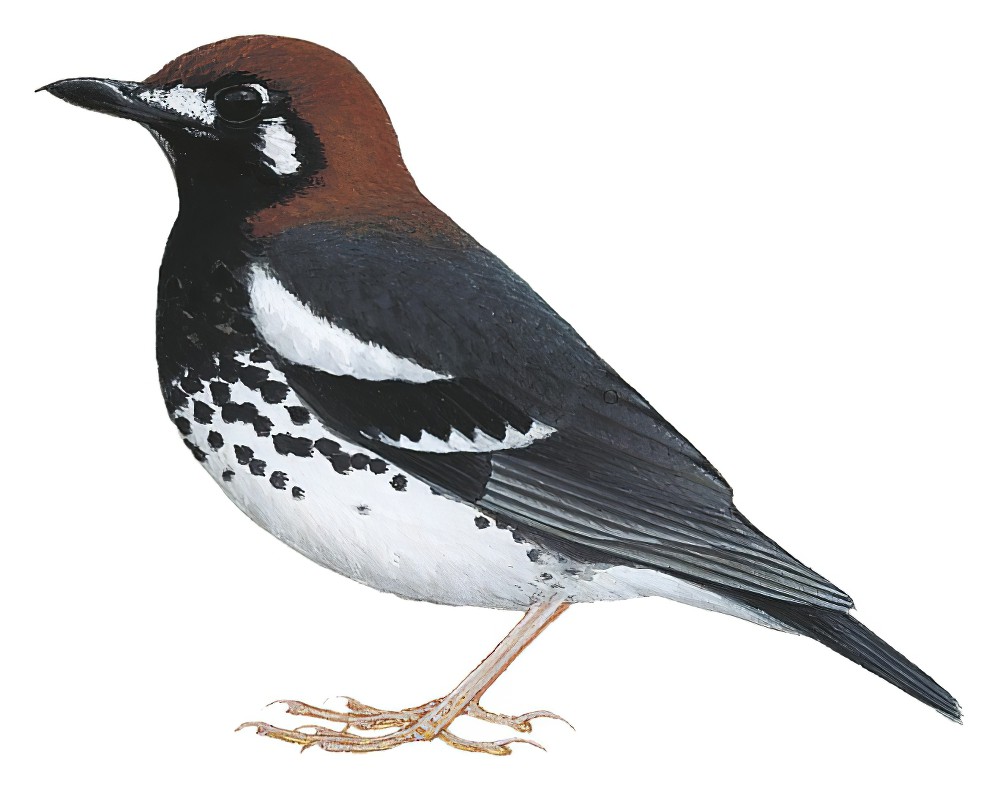Chestnut-capped Thrush / Geokichla interpres

Chestnut-capped Thrush
SCI Name:
Protonym: Turdus interpres Pl.Col. livr.77 pl.458
Taxonomy: Passeriformes / Turdidae / Geokichla
Taxonomy Code: chcthr1
Type Locality: Java and Sumatra.
Author: Temminck
Publish Year: 1828
IUCN Status: Endangered
DEFINITIONS
GEOKICHLA
(Turdidae; Ϯ Orange-headed Thrush G. citrina) Gr. γεω- geō- ground- < γη gē earth; κιχλη kikhlē thrush; "Vogels. ... Geo-Kichla singularis." (Macklot 1830) (nom. nud.); "Myiothera loricata, MULL., pl. V. fig. 5. Behoort tot de afdeeling der grootere soorten van vliegenjagers, bij welke de staart iets meer verlengd is, en die door geheele gedaante reeds sterk tot de lijsters (Turdi) naderen. Tusschen hen en dit laatste geslacht staat het genus: Geokichla BOIE, waarvan de Turdus citrinus LATH. de typus is." (S. Müller 1835); "Geokichla Müller, 1835, Tijdschr. Natuur. Gesch. Phys., 2, pl. 3, p. 348. Type, by original designation, Turdus citrinus Latham." (Ripley in Peters, 1964, X, p. 144).
Synon. Cryptocichla, Geocichloides, Pseudoturdus, Turdulus.
geokichla
Gr. γεω- geō- ground- < γη gē earth; κιχλη kikhlē thrush.
interpres
L. interpres, interpretis messenger, interpreter < inter among, between; pretium value, reward < Sanskrit root prath- to spread abroad.
● Linnaeus, on his visit to Gotland in 1741, mistakenly received the impression that the name Tolk was applied to the Ruddy Turnstone. In standard Swedish tolk means translator or interpreter. However, the Gotland dialect name Tolk stalk (legs), refers to the Common Redshank (Tommy Tyrberg in litt.); "78. TRINGA. ... Interpres. 4. T. pedibus rubris, corpore nigro albo ferrugineoque vario, pectore abdomineque albo. It. gottl. 217. Fn. svec. 154. Morinellus canadensis. Edw. av. 141. t. 141. Habitat in Europa & America septentrionali.” (Linnaeus 1758) (Arenaria).
● The “Merle messager” of Temminck 1828; alluding to the black and white uniforms and red caps of postmen of the period (Geokichla).
UPPERCASE: current genus
Uppercase first letter: generic synonym
● and ● See: generic homonyms
lowercase: species and subspecies
●: early names, variants, mispellings
‡: extinct
†: type species
Gr.: ancient Greek
L.: Latin
<: derived from
syn: synonym of
/: separates historical and modern geographic names
ex: based on
TL: type locality
OD: original diagnosis (genus) or original description (species)












